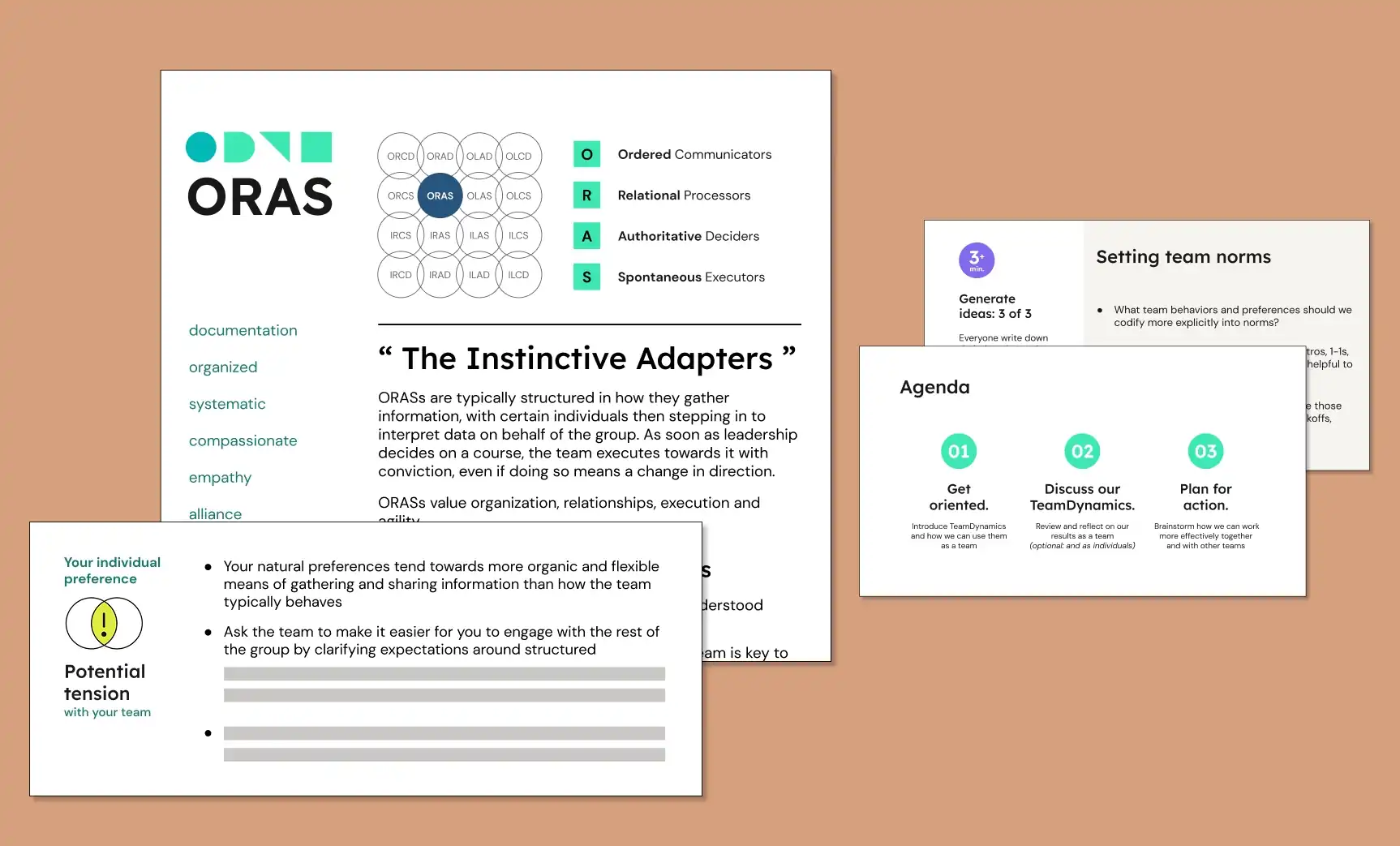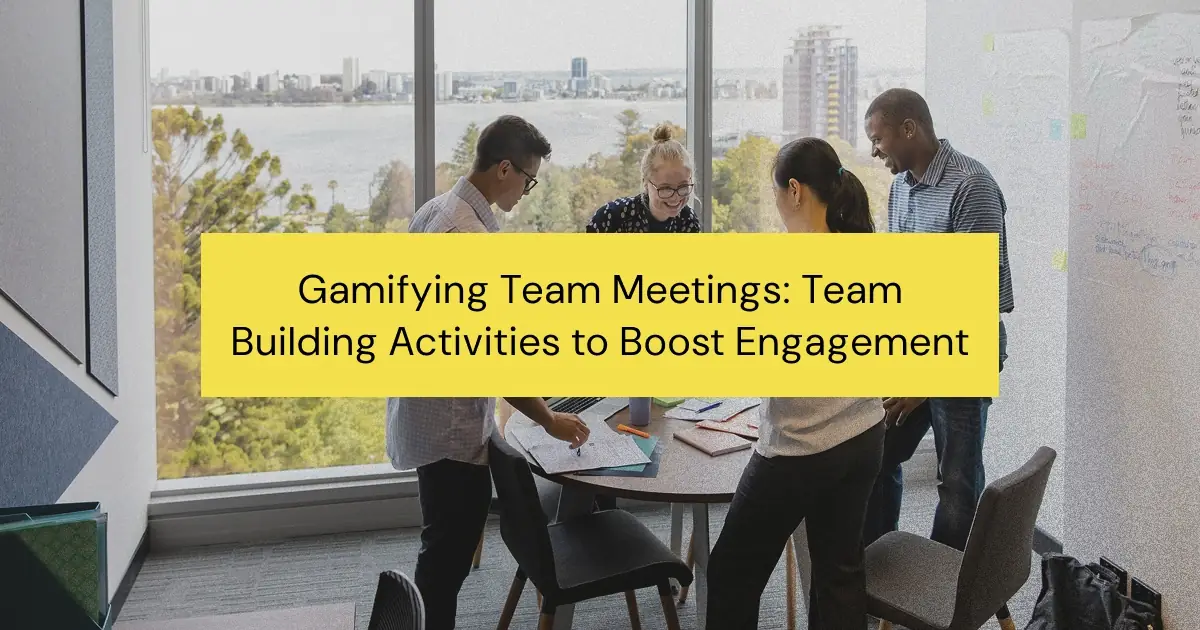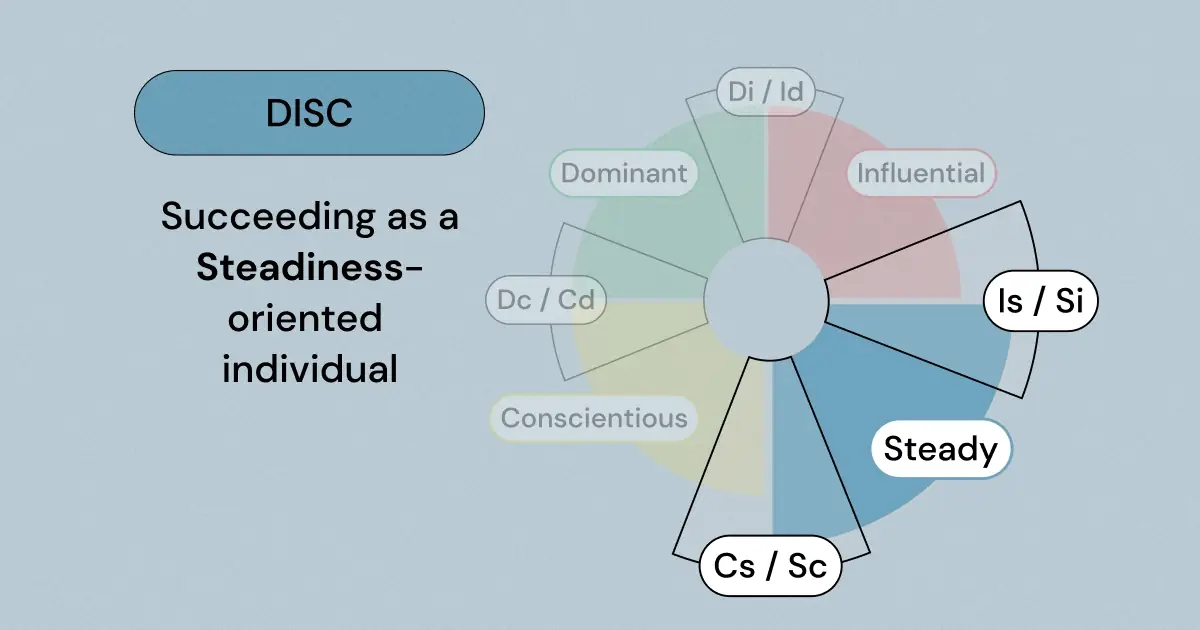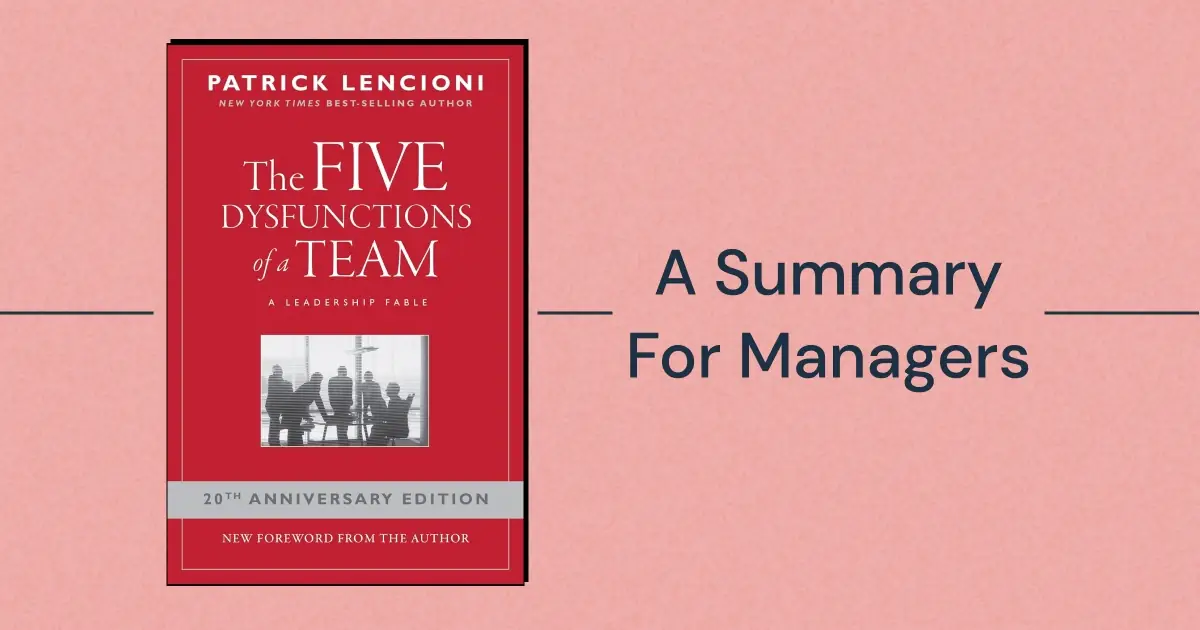Imagine this: You're sitting in a team meeting, glancing around the room at your colleagues. You've worked with them for months, yet sometimes they feel like puzzles wrapped in enigmas. Why does John prefer solitary tasks while Sarah thrives in group discussions? Understanding these intricacies isn't just a curiosity – it's the key to unlocking your team's full potential. That's where personality tests come into play.
Looking for team meeting topics for your next team meeting? Check out our list of 10+ team meeting ideas.
In today's fast-paced work environment, where team dynamics can make or break project success, grasping the varying personalities in your team isn't just helpful; it's essential. Personality tests in team settings aren't about pigeonholing people into neat boxes. Instead, they're tools for unveiling the diverse strengths and preferences that each team member brings to the table.
Here's the deal: When you harness the power of these insights in your team meetings, you transform routine gatherings into sessions of profound team building and learning. This isn't just a theory; it's a game-changing strategy used by successful teams across the globe.
Check out our list of the best assessment tools for team building.
In this blog post, we'll explore how personality tests can be a catalyst for team building in professional settings. We'll navigate through their benefits, practical application in team meetings, and share success stories that prove their worth. So, buckle up and get ready to discover how a simple test could revolutionize your team dynamics and lead to greater productivity, understanding, and, most importantly, a more cohesive and dynamic team.
The Importance of Understanding Team Dynamics
Ever felt like your team is just a group of strangers working towards a common goal, but not quite clicking together? You're not alone. In the diverse landscape of modern workplaces, where teams are often a mix of various backgrounds, personalities, and working styles, finding harmony can be a challenge. But here's the kicker: understanding the dynamics of your team isn't just a nice-to-have, it's crucial for success.
First off, let's talk about the elephant in the room – team conflict. It's inevitable when people with different viewpoints and approaches collide. But, what if I told you that conflict isn't always bad? That's right. When managed well, it can lead to breakthrough ideas and innovation. The secret sauce? Understanding each other's personality traits. This knowledge can turn potential clashes into creative sparks.
Here's another thing: diverse teams win. Studies show that teams with a variety of perspectives outperform homogeneous groups. But diversity isn't just about demographics; it's also about diverse thinking. And to leverage this, you need to understand the unique viewpoints each personality type brings to the table. This is where personality tests become your best friend.
Let's take a real-world example. Imagine a tech startup with a mix of creative minds, analytical thinkers, and systematic planners. At face value, they might seem to be working on different wavelengths. But with the insight from personality tests, they can understand and appreciate each other's approaches, leading to a synergy that drives innovation and success.
In essence, the crux of team success lies in understanding and appreciating the diverse personalities within the team. It's about harnessing each individual's strengths and turning potential friction into constructive collaboration. And guess what? The next sections will guide you on how to do just that, using personality tests as your roadmap to a more cohesive, dynamic, and successful team.
{{inline-cta}}
What Are Personality Tests?
Now, let's get down to brass tacks: What exactly are personality tests, and why are they causing such a buzz in professional circles? Think of personality tests as the GPS for navigating the complex world of human behavior in the workplace.
At their core, personality tests are tools designed to uncover the different ways people think, feel, and interact. These tests categorize personalities into various types based on certain traits. It's like having a cheat sheet that helps you understand your teammates beyond their job titles and skills.
Popular examples? You've probably heard of the Myers-Briggs Type Indicator (MBTI), TeamDynamics, or the DISC Assessment. These aren't just trendy acronyms; they're methodologies backed by psychology to help us understand behavioral preferences.
- MBTI, for instance, breaks down personality into 16 different types. If you've ever heard someone describe themselves as an "ENFP" or "ISTJ," they were referring to their Myers-Briggs type!
- TeamDynamics is the personality test specifically designed for team building. It assesses a team's behaviors to assess how groups of individuals Communicate, Process information, Decide on a course of action, and Execute towards their objectives.
- DISC focuses on four primary behavior traits: Dominance, Influence, Steadiness, and Conscientiousness.
But here's the million-dollar question: Are these tests accurate? While no test can claim 100% accuracy in defining complex human behaviors, they do provide valuable insights. They're like mirrors reflecting how we perceive the world and make decisions. And in a team setting, they're akin to having a roadmap that highlights the different routes your teammates are likely to take.
The beauty of personality tests lies in their simplicity and applicability. They're not just for psychologists or HR professionals. They're for team leaders, project managers, and even team members who seek a deeper understanding of their colleagues.
In essence, personality tests offer a language for teams to communicate their differences in a constructive way. They're the bridge that connects diverse individuals, helping them work together more effectively. So, in the next section, we'll explore how you can integrate these insightful tools into your team meetings to foster a more harmonious and productive team environment.
Integrating Personality Tests into Team Meetings
Now, let's tackle the real challenge: How do you weave personality tests into the fabric of your team meetings without it feeling like another box-checking exercise? It's simpler than you might think, and the payoff is huge. Integrating these tests can turn your average team meeting into an engine of team understanding and growth.
Step 1: Choose the Right Test
First things first, pick a personality test that suits your team's needs. Whether it's the a fun personality test for team building like TeamDynamics, the in-depth personality analysis of the MBTI or the straightforward approach of the DISC assessment, the key is to choose one that your team will find easy to understand and relevant to their work.
TeamDynamics offers a trial free personality test for team building that takes just 2 minutes to try on your own!
Step 2: Make it a Team Activity
Instead of assigning the work personality test as homework, why not make it a part of your team meeting? This approach turns the experience into a shared journey. It's not just about filling out a questionnaire; it's about discovering together how each team member ticks.
TeamDynamics features a fast and simple online survey that your team can take in as little as 15 minutes.
Step 3: Discuss the Results Openly
Once everyone has their results, dedicate a portion of your meeting to discuss them openly. Many personality tests also include personality workshop activities to help bring the results to life. Encourage team members to share their thoughts on their personality type and how they think it influences their work. This open dialogue is crucial for building understanding and empathy within the team.
Every TeamDynamics Pro result includes a customized facilitation guide presentation, making it easy to have a discussion about your team personality test results.
Step 4: Apply Insights to Real Situations
Now, for the fun part. Use the insights gained from the tests to tackle real team challenges. Got a complex project on the horizon? Discuss how each personality type might approach it. This not only helps in planning but also gives team members a sense of how their unique traits contribute to the team's success.
Step 5: Keep the Conversation Going
Finally, don't let the conversation end with the meeting. Encourage team members to keep reflecting on their personality traits and how they interact with others. This ongoing discussion helps cement the understanding and respect fostered during the meeting.
Remember, the goal here isn't to label or box people into categories. It's about using a fun and engaging tool to gain insights into how different personalities can work together more effectively. By integrating personality tests into your team meetings, you're not just fostering better teamwork; you're building a more cohesive, understanding, and dynamic work environment.
In the next section, we'll dive into the many benefits that come from this deeper understanding and how it can transform the way your team operates.
Benefits of Using Personality Tests for Team Building
So, why should your team take a detour through the world of personality tests? The benefits are more tangible than you might expect. Let's break down how understanding personality types can be a game-changer for team building and overall performance.
Enhanced Communication and Understanding
First off, communication is king in any team. Personality tests are like decoders that help team members understand each other's communication styles. For example, knowing who in your team is an introvert or extrovert can drastically change how you conduct meetings or assign tasks. This leads to fewer misunderstandings and a more harmonious work environment.
Diverse Problem-Solving Approaches
Every personality type brings a unique problem-solving style to the table. By understanding these styles, teams can tackle challenges more effectively. It's like having a Swiss Army knife for problem-solving; each tool (or personality type) offers a different and effective solution. This diversity in approaches fosters creativity and often leads to more innovative solutions.
Better Conflict Resolution
Conflicts aren't necessarily a bad thing; they're often a sign of diverse ideas. However, resolving them constructively is key. With personality tests, team members can better understand where others are coming from, which often leads to quicker and more amicable resolutions. It's like having a roadmap to navigate the sometimes-tricky terrain of interpersonal conflicts.
Increased Employee Engagement and Satisfaction
When team members feel understood and valued for their unique contributions, engagement and job satisfaction skyrocket. Personality tests can help in aligning tasks and roles with individual preferences and strengths, leading to a more motivated and fulfilled team.
Case Studies: Real-world Examples of Successful Teams Using Personality Tests
How have real teams used personality tests to supercharge their dynamics and productivity? Let's dive into some compelling examples that showcase the transformative power of understanding personality types in a professional setting.
Google: Project Aristotle's Revelations
Let's start with a titan in the tech world: Google. In their renowned Project Aristotle, Google sought to uncover what makes a perfect team. The surprising discovery? It wasn't about who was on the team but how they interacted. Understanding and respecting each other's personality traits played a key role in their most successful teams. By focusing on psychological safety, a concept closely tied to personality dynamics, Google teams were able to foster environments where every member felt comfortable and valued, leading to higher levels of innovation and collaboration.
Zappos: Culture as a Cornerstone
Next up, Zappos, a company famous for its vibrant culture. Zappos uses personality tests to enhance their team interactions and ensure cultural fit. By understanding the different personality types, they've created an environment where diverse styles and perspectives are not just accepted but celebrated. This approach has been crucial in building a strong, cohesive team that's also incredibly customer-focused.
Deloitte: Tailoring Leadership
Deloitte, a global leader in consulting, uses personality tests to develop tailored leadership strategies. By understanding the diverse personalities within their teams, leaders at Deloitte are better equipped to assign tasks, manage conflicts, and provide support in ways that resonate with each team member. This personalized approach has led to more effective teams and a stronger, more inclusive corporate culture.
The Power of Personality Tests in Various Industries
These examples aren't just limited to tech and consulting giants. Organizations across healthcare, education, and non-profits are also leveraging personality tests to enhance team dynamics. Hospitals use them to improve patient care by ensuring teams communicate effectively. Schools utilize them to create more collaborative and understanding staff environments. Even non-profits use personality insights to boost teamwork in tackling societal challenges.
These real-world examples illustrate that no matter the industry or company size, understanding the diverse personalities within a team can lead to remarkable improvements in collaboration, innovation, and overall team success. In our next section, we'll discuss potential pitfalls to avoid when using personality tests and how to navigate them successfully.
Best Practices for Using Personality Tests in Team Meetings
Integrating personality tests into team meetings is more than just a fun activity; it's a strategic move. But to really hit the mark, it's crucial to follow some best practices. Here's how you can ensure that these tests contribute positively to your team's dynamics and productivity.
Looking for the best tools to help you run your team meeting? Check out 35+ essential tools for running a weekly team meeting (including the latest AI technology!).
Interpreting Results the Right Way
First and foremost, remember that personality tests offer insights, not definitive answers. They should be used as a starting point for discussion, not as a rigid classification system. Encourage your team to view the results as a lens to understand different perspectives, rather than a label that confines them.
Focus on Team Development, Not Labels
It's easy to fall into the trap of stereotyping team members based on their personality test results. Avoid this by emphasizing the purpose of these tests: to develop the team as a whole. Use the insights to foster collaboration and understanding, rather than creating divisions.
Encourage Openness and Respect
A vital aspect of using personality tests is fostering an environment where team members feel comfortable sharing their results and discussing them openly. This openness should be coupled with respect for each individual's privacy and perspective. Make it clear that participation is voluntary and that all viewpoints are valued.
Apply Insights to Real-World Scenarios
To make the most of personality tests, apply their insights to actual team challenges and scenarios. Discuss how different personality types might approach a project or resolve a conflict. This practical application helps team members see the real-world value of understanding each other's personalities.
Continuous Learning and Development
Finally, make personality testing an ongoing process. As teams evolve, so do individual roles and dynamics. Regular check-ins where team members can discuss their growth and changes in their personality traits can be incredibly beneficial. It keeps the team aligned and responsive to each other's development.
By adhering to these best practices, you turn personality tests from a one-off activity into a powerful tool for ongoing team development. The result? A team that not only understands each other better but also works together more effectively, innovatively, and harmoniously.
Potential Pitfalls and How to Avoid Them
While personality tests can be powerful tools for team building, they're not without their challenges. Awareness of potential pitfalls and knowing how to avoid them is crucial for getting the most out of these tests. Let's explore some common issues and how to navigate them effectively.
Avoiding Over-Reliance on Test Results
First and foremost, it's important to remember that personality tests are guides, not definitive answers. Relying too heavily on these tests can lead to stereotyping or oversimplifying complex human behaviors. The key is to use the results as a starting point for deeper understanding and discussion, not as a strict rulebook.
Navigating Privacy Concerns
Respecting individual privacy is paramount, especially in a team meeting personality test setting. Some team members may feel uncomfortable sharing their personality test results. It's essential to make participation voluntary and to create an environment where people feel safe to share as much or as little as they're comfortable with.
Preventing Labeling and Boxed Thinking
Personality tests categorize people into types, but this shouldn't lead to labeling or boxed thinking. Avoid using personality types as the sole basis for assigning roles or making decisions about team members. People are more than their personality type; they're individuals with a range of skills and experiences.
Dealing with Skepticism
Not everyone is a believer in the efficacy of personality tests. It's important to address skepticism by discussing the purpose and limitations of the tests. Emphasize that these tools are meant to enhance, not replace, personal interactions and judgments.
Ensuring Continuous Learning and Adaptation
Finally, remember that personalities are not static. People change and grow, and so do their roles within a team. Encourage regular revisits to personality tests to reflect on any changes and adjust team dynamics accordingly.
By being mindful of these pitfalls and approaching personality tests with a balanced and respectful attitude, you can harness their full potential for building a stronger, more cohesive team.
Conclusion
As we've navigated through the intricacies of using personality tests in team meetings, one thing is crystal clear: understanding the diverse personalities in your team is not just beneficial; it's essential for fostering a thriving work environment. These tests are more than just fun activities or corporate formalities – they're powerful tools for unlocking the full potential of your team. Remember:
- Understanding Leads to Growth: By understanding the different personality types in your team, you encourage a culture of empathy and respect, leading to enhanced communication and collaboration.
- Diversity Drives Innovation: Embracing the diverse problem-solving approaches that come with varied personalities fosters creativity and innovation in your projects.
- Adaptability is Key: Remember, the use of personality tests is not a one-time event but an ongoing journey. As your team evolves, so should your approach to understanding and leveraging their unique traits.
Now that you're armed with the knowledge of how personality tests can revolutionize your team meetings, it's time to put this into action. Whether you're leading a small startup or managing a team in a large corporation, begin by choosing a suitable personality test. Then, integrate it thoughtfully into your team meetings, keeping in mind the best practices we've discussed.
And remember, the goal here is to build a more cohesive, understanding, and dynamic team. As you embark on this journey, keep an open mind, encourage ongoing dialogue, and watch as your team transforms into a more unified and productive unit.


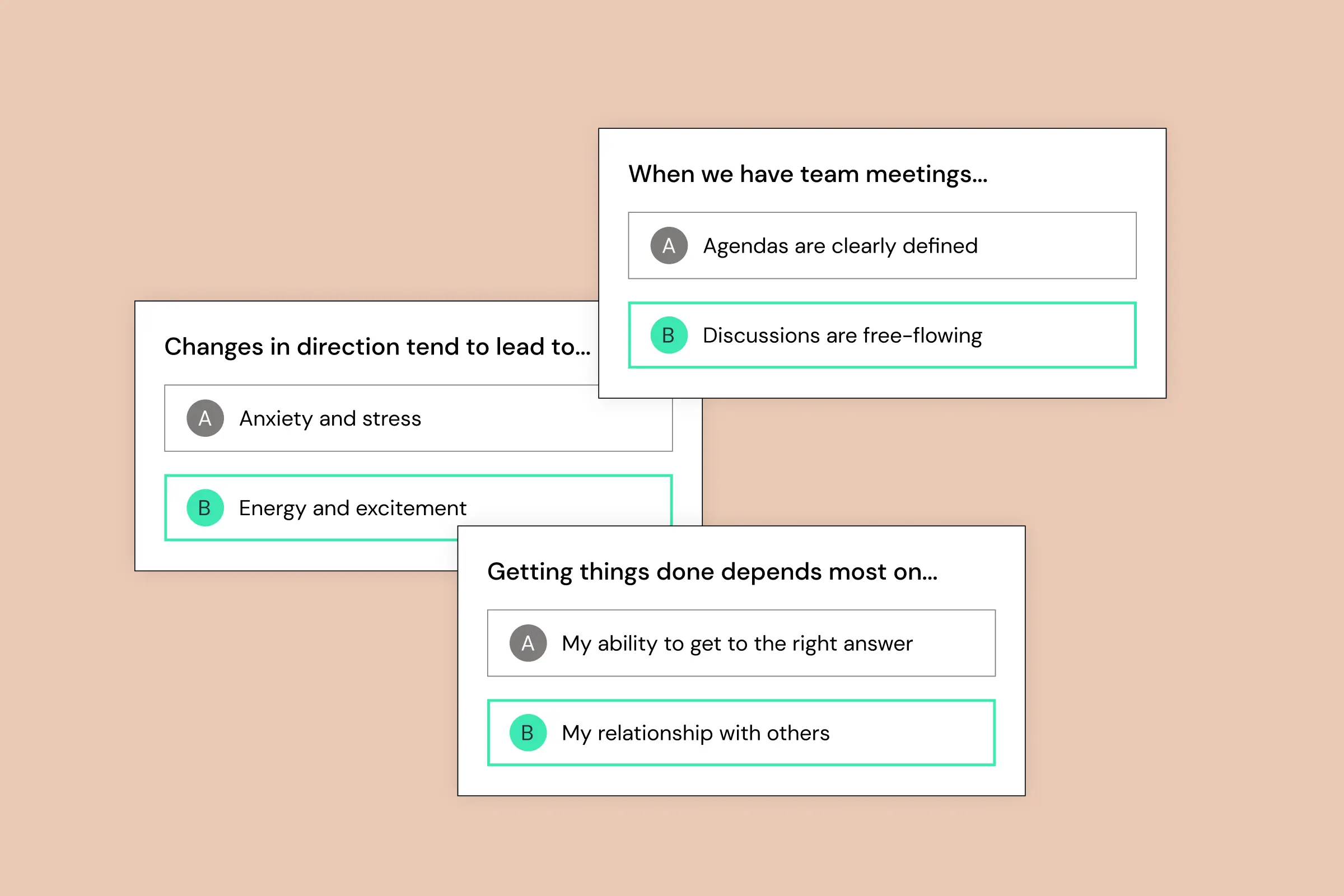

.png)

